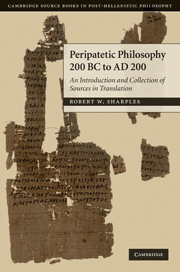Book contents
- Frontmatter
- Contents
- Preface
- Abbreviations
- Introduction
- Individuals
- Logic and ontology
- Ethics
- Physics
- Chapter 19 The nature of time and place
- Chapter 20 The eternity of the world
- Chapter 21 The heavens
- Chapter 22 God and providence
- Chapter 23 Fate, choice and what depends on us
- Chapter 24 Soul
- Chapter 25 Generation
- Chapter 26 Sensation
- Chapter 27 Intellect
- Bibliography
- Index of sources
- Index of passages cited
- Index of personal names (ancient)
- General index
Chapter 25 - Generation
Published online by Cambridge University Press: 05 June 2012
- Frontmatter
- Contents
- Preface
- Abbreviations
- Introduction
- Individuals
- Logic and ontology
- Ethics
- Physics
- Chapter 19 The nature of time and place
- Chapter 20 The eternity of the world
- Chapter 21 The heavens
- Chapter 22 God and providence
- Chapter 23 Fate, choice and what depends on us
- Chapter 24 Soul
- Chapter 25 Generation
- Chapter 26 Sensation
- Chapter 27 Intellect
- Bibliography
- Index of sources
- Index of passages cited
- Index of personal names (ancient)
- General index
Summary
Galen, On Seed 1.1 (CMG V.3.1 64.4–14 De Lacy 1992)
What is the usefulness and what is the power of the seed? Does it count as two principles, material and efficient, as Hippocrates supposed, or only as the second, the efficient, as Aristotle thinks, judging that it is a source of change for the menses, but not allowing that the living creature is fashioned from it? It is worth considering and deciding a disagreement among such great men, not entrusting it to persuasive arguments, which the majority of doctors and philosophers take delight in, but demonstrating [the facts of the case] from clear [principles] and through clear [arguments]. Since Aristotle too thinks that one should take premisses for demonstrations from experience concerning each of the things enquired into, let us first consider this accurately, whether the seed remains within the women who are going to conceive, or whether it is ejected.
Galen, On Seed 1.3 (CMG V.3.1 68.3–70.24 De Lacy 1992)
(1) This [that the womb retains and indeed sucks in the seed] I have said on account of some of the contemporary philosophers, Aristotelians and Peripatetics as they call themselves. For I would not myself call them so, when they are so ignorant of Aristotle’s opinion as to think that he judges that the male’s seed, deposited in the female’s womb, imparts a beginning of change to the menses, but after that is ejected, not becoming any part of the bodily substance of what is conceived. (2) They are misled by the first book of On the Generation of Animals, which is the [only] one of the five that they have read. For in this it is written: ‘As we said, one might posit as the principles of generation not least the female and the male; the male as possessing the principle of the change and the generation, the female [as possessing the principle] of the matter’ [1.2.716a4–7]. This, then, is not long after the beginning. (3) Later on in the work [Aristotle] also writes as follows: ‘But it comes about as is reasonable, since the male provides the form and the principle of the change, the female the body and the matter, as in the setting of milk the body is the milk, but the fig-juice or rennet is what has the principle that causes the setting’ [1.21.729a9–13]. (4) Taking these remarks as their starting-point, some think that the seed, having provided the menses with the principle of change, is ejected again; (5) but some say that [Aristotle] is not saying what all of us who take [what he says] in the natural way supposed, but rather that the female contributes only the matter to what will be conceived, the male both matter and also form. Consequently one of them greatly ridiculed me for thinking that the seed is ejected again from the female, or remains inside but is dissolved into nothing. For they say that this follows, if we think that the bodily substance [of the male seed] is not mixed and blended in the matter of what is conceived.
- Type
- Chapter
- Information
- Peripatetic Philosophy, 200 BC to AD 200An Introduction and Collection of Sources in Translation, pp. 252 - 256Publisher: Cambridge University PressPrint publication year: 2010



